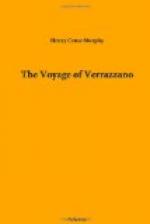Yet he never recognized by word or deed the voyage or discovery of Verrazzano. If any one in France could have known of them, surely it would have been he who had sent forth the expedition. If Verrazzano were dead, when Francis returned to his kingdom, and the letter had miscarried and never come to his hands, the knowledge of the discovery still would have existed in the bosom of fifty living witnesses, who composed the crew, according to the story; and through them the results of the voyage would have been communicated to the king. But Verrazzano was not dead, at that time, but was alive, as will appear hereafter, in 1527. There is good reason to believe that he was well known then to the royal advisers. One of the first acts of the king after his return from Spain was to create Phillipe Chabot, Sieur de Brion, the admiral of France, whereby that nobleman became invested on the 23d of March, 1526, with the charge of the royal marine. [Footnote: Pere Anselme, iv, 57l.] A document has recently been brought to light from among the manuscripts in the Bibliotheque Nationale in Paris, purporting to be an agreement made by Chabot in his official capacity, with Jean Ango, of Dieppe, and other persons, including Jehan de Varesam, for a voyage to the Indies with two vessels belonging to the king, and one to Ango, to be conducted by Varesam, as master pilot, for the purpose ostensibly of bringing bask a cargo of spices. [Footnote: M. Margry. Navigations Francaises, p. 194. See Appendix.] This instrument has no date, but on its face belongs to Chabot’s administration of the admiralty, and must, therefore, have been drawn up in the year 1526 or that of Verrazzano’s death, in 1527. If it be genuine, it proves not only that Verrazzano was alive in that period, but was known to the admiral, and, consequently, that any services which he had previously rendered must have been in the possession of the crown. In either case, however, whether Verrazzano were dead or alive when Francis resumed his royal functions, there is no reason why the discovery, if it had ever taken place, should not have been known by him.
In sending forth the expeditions of Jacques Cartier and the joint expeditions of Cartier and Roberval, Francis not only showed his interest in the discovery of new countries, but he acted in perfect ignorance of the Verrazzano discovery. If it were known to him, upon what rational theory would he have attempted new voyages of discovery in a cold and inhospitable region, on an uncertain search, instead of developing what had been found for him? What could he have expected to have accomplished by the new expeditions that had not been already fully effected by Verrazzano? And, especially after the way to Canada was found out by Cartier, what was there more inviting in that unproductive quarter than was promised in the temperate climate, fertile soil, and mineral lands, which the Florentine had already discovered in his name, that




